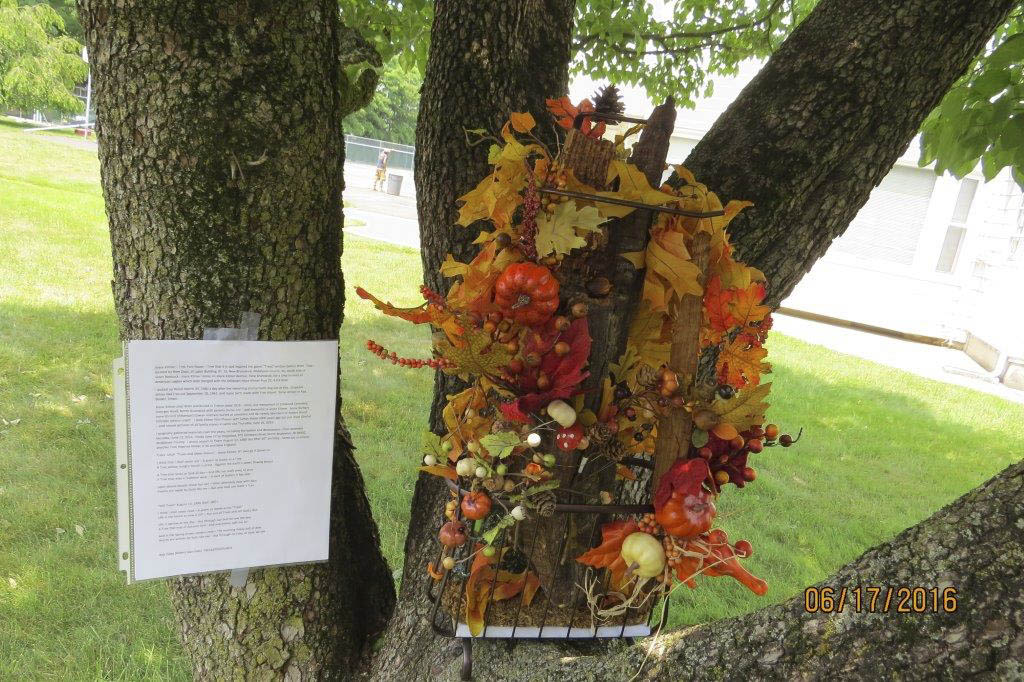By JENNIFER AMATO
Staff Writer
NORTH BRUNSWICK — Inspired by a poem written more than 100 years ago, a North Brunswick man is sharing his sequel to a literary work that has profound historical ties to the Brunswick area.
Alfred “Joyce” Kilmer of New Brunswick was born on Dec. 6, 1886. He enlisted in the military three weeks after World War I began and was killed by a sniper in 1918, receiving the French equivalent of a medal of honor. He was buried in France, but there is a memorial and family plot at Elmwood Cemetery in North Brunswick.
North Brunswick resident Robert A. Paley is a veteran himself, having served in the U.S. Air Force from June 29, 1965 to Dec. 20, 1968. He was a sergeant at Korat Royal Thai Air Force Base in Thailand from the fall of 1966-67.
He is a member of the Joyce Kilmer American Legion Post 25 and the Clark-Moetz VFW Post 2319, both in Milltown, and a former member of A. Leigh Pardun American Legion Post 459 in North Brunswick.
However, his interest in Kilmer began as an elementary school student in the 1950s, when he and his classmates learned of the poem “Trees” written by Kilmer about an oak tree on the Rutgers campus: “I think that I shall never see – A poem lovely as a tree ….”
Fast-forward about two decades — when Paley had heard in the news that the white oak would be uprooted, he decided to go to the New Jersey Department of Labor site near the current Sears store on Route 1 in New Brunswick on March 29, 1980, the day after the uprooting of the stump.
Paley was inspired by his maternal grandfather, Henry S. Dellecker, who was an amateur archeologist who owned a large collection of Lenni Lenape Indian stones.
“I might have thought at the time that the entire tree was being cut, but later I learned that the initial cutting down of the tree was Sept. 18, 1963. I remember feeling, in 1980, that part of history was being lost, and also, I was wondering how known nationally was the poem?
“I’m sure I read later that the initial tree was preserved in some parts by making items, but I don’t know the detail, but I managed to preserve a few fairly nice sized parts of the root or base system, and some years later I started to spray some clear coating over several years to preserve the wood. I had always thought about making some kind of memorial at a later date. I remember that eerie feeling of witnessing history being uprooted after long ago learning of the poem,” Paley recalled.
Paley was so inspired that he wrote a sequel to “Trees,” called “Still Trees,” on Aug. 13, 1980, the day after his 34th birthday, “as a way to give credit and more meaning to Kilmer,” he said.
“I realized as time went on — and including my children and grandchildren — that some students were not aware of the poem and history,” he said.
Paley had written many poems as a teenager, and in his early 20s, he wrote songs as he commuted from North Brunswick to North Branch. He has also written histories, mostly family-types which one can add to over the years, he said.
“I’d like to settle down to write a book about how the Constitution is being changed by the politicians who might not have the perspective and foresight of our Founding Fathers,” he said.
Paley attended University College at Rutgers on the G.I. Bill, graduating in 1979 with a bachelor’s degree in political science and business. He generally worked in sales for manufacturing and held a local committee seat in North Brunswick from 1970-81.
North Brunswick Township honored Paley’s military service last year with a secondary street sign at Newton Street and Cranbury Cross Road for “Paley Way.” He also had the privilege of getting a veterans tree with a boulder and plaque at North Brunswick Community Park in time for Memorial Day 2015.
Contact Jennifer Amato at [email protected].
“Still Trees”
By Robert A. Paley
I think I shall never read – A poem as lovely as his “Trees”
Life in the forest as now is still – But not all Trees and not God’s Will.
Life is narrow as the day – But through our God he saw the way
A Tree that may of Autumn fare – Red and Amber soft the Air
And in the Spring Green renders new – The morning Valley soft of dew
Words are written by fools like me – But through his Eyes, our God, we see.

